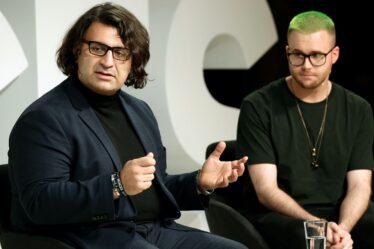
Parade is officially off the market. But its exit has raised more questions than excitement.
The Gen-Z intimates start-up said Tuesday that it is set to be acquired by Ariela & Associates International, best known for owning the licence to Fruit of the Loom’s bra line. Cami Téllez, who was 21 when she founded the brand in 2018, is leaving the business. Financial terms were not disclosed.
The sale of what had been a standard bearer for the next generation of direct-to-consumer brands to a little-known strategic is the latest sign that the fashion start-up bust is ongoing. Like other upstart brands, Parade quickly built a following in the crowded lingerie market, offering a cooler, more-inclusive alternative to incumbents like Victoria’s Secret. It recruited some 75,000 mostly unpaid ambassadors, creating content on Instagram and TikTok that gave the brand an outsized presence online and in the minds of its young target customers.
Parade was on track to generate $75 million in sales this year, Téllez told BoF in February, and had recently entered Target (its first major wholesale account was with Urban Outfitters starting last year). Téllez also said Parade halved its cash burn in 2022 and was on track to reach profitability by the end of 2023.
But in a high-interest rate environment where investors are reluctant to dole out cash to unprofitable start-ups, Parade may simply have run out of time, analysts say.
“It’s become clear that companies that had been kept afloat by raise after raise, need to find a way to operate sustainably, or they run the risk of going under,” said Simeon Siegel, managing director and senior analyst of retail and e-commerce at BMO Capital Markets. “Sometimes the path ends up becoming a full-out sale.”
A Gen-Z Wunderkind
Parade’s brightly-hued products quickly captivated Gen-Z consumers, as did its marketing, which featured models with a range of body shapes and gender identities.
A community-oriented advertising approach also helped it stand out in a crowded market of digitally-native start-ups. Its customers-turned-ambassadors can offer feedback that the brand said it took into consideration in the product development process. A line of boxer briefs, trunks and bodysuits released in June 2022, for example, was created with input from the over 5,000 members of Parade’s Slack community on the types of underwear and colours they wanted to shop.
In a December 2022 interview with BoF, Téllez said these community-centric product development tactics drove sales growth and strengthened Parade’s customer retention, though she didn’t share specific figures.
“Much more of our revenue comes from repeat customers as we launch new categories and new fabrications,” Téllez said. “Those make up more and more of our revenue each year.”
A Parade of Unflashy Exits
Profitability proved more elusive. The company raised $13 million last September at a $200 million valuation, and was exploring other, cheaper ways to get its products in front of customers.
Here too, Parade helped set the trend. While it wasn’t the first DTC brand to partner with a traditional multibrand retailer, its decision to enter Urban Outfitters in July 2022 was still noteworthy at the time. Also that year, Allbirds expanded its wholesale network to REI and other major retailers; in February 2023, Glossier said it would go into Sephora.
Wholesale has helped Allbirds and other brands narrow their losses. But Parade went on the hunt to secure new funds, attempting to raise money in May before shifting focus to an outright sale, according to one investor.
Experts say money-losing consumer goods start-ups are a tough sell to venture capital firms right now, as spending on discretionary items is unpredictable, and customer acquisition costs remain high. Finding a buyer is often these companies’ best — or only — option.
Victoria’s Secret, which closed its $400 million acquisition of fellow DTC intimates start-up Adore Me in January, was reportedly in talks to acquire Parade this year before those discussions fell through as the lingerie giant focussed on relaunching its fashion show, Puck News previously reported. That now looks like a best-case scenario. In July, intimates start-up Cuup sold to FullBeauty Brands, which owns a number of brands catering to plus-size consumers, including size-inclusive apparel start-up Eloquii. That same month, luxury shoe start-up Tamara Mellon announced a partnership with licensing company Titan Industries, which produces footwear for brands like Badgley Mishka and L’Agence. It will take over Tamara Mellon’s operations and manufacture its goods.
“The amount of M&A activity that is going to be happening over the next 18 months is going to be massive,” said Brian Sugar, founder and managing partner of Sugar Capital, who has invested in Everlane, Olive & June, Savage X Fenty and more. “There’s going to be a good portion of them that are consumer brands that need to find a new home because there’s no capital allocators deploying capital with these unprofitable businesses.”
Parade Marches On
In a statement, Téllez said she was “incredibly proud of what we built with Parade… [acquiring] 750,000 passionate customers and captured over 1 percent of a highly competitive market.”
“While I won’t be with Parade in its next chapter, I only turned 26 yesterday — this is the first inning of my story. Stay tuned,” she wrote. “My priority in this deal was finding a home for this incredible, generation-defining brand and the team behind it.”
However, in internal Slack messages obtained by BoF, Téllez said she felt she was being pushed out, and said she wouldn’t make any money from the sale. The messages were first reported by Business Insider.
“I am heartbroken to not be joining you guys in this next phase. It was my greatest wish to see this brand swell to new heights and work with all of you to continue to lead the category so fearlessly,” she wrote in the Slack messages, adding that she “pushed for this deal so that Parade would have a future and to protect all of you guys + ensure your positions.”
Still, Parade is a brand with a rabid fan base and strong name recognition with its target customer. The brand’s financial state likely presented an opportunity for a company like Ariela & Associates International to add a buzzy, young brand to its portfolio, experts say. Parade can leverage its new parent company’s prowess in areas like design and inventory planning to grow sales and expand internationally.
Before today, Ariela & Associates International was best known for its Fruit of the Loom licence. But the company does have a stable of intimates brands, including its own in-house brand, Smart & Sexy and size-inclusive lingerie start-up Curvy Couture, which it acquired in 2019.
While it may lack the glamour of Victoria’s Secret, let alone an initial public offering, deals like Parade’s aren’t necessarily the end of the road, said Ari Bloom, founder and CEO at CPG brand developer A-Frame Brands.
“Let’s not frown on these deals because they’re not $2 billion deals to PVH,” he added. “If we’ve got good brands in the market, and they’re succeeding, but maybe need more resources behind them, this is the right way to build more value for everybody, including consumers.”



